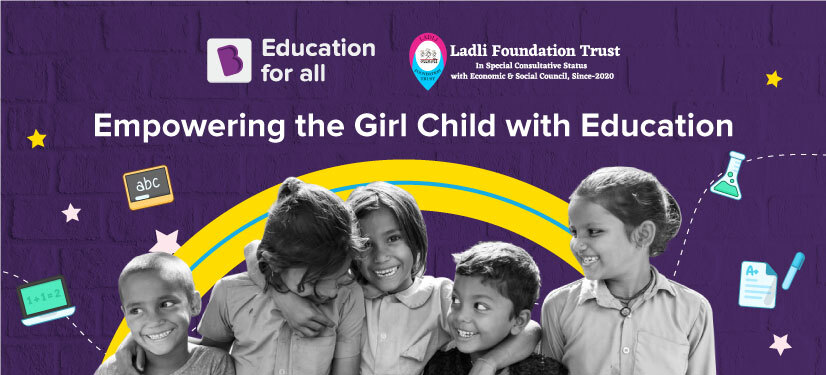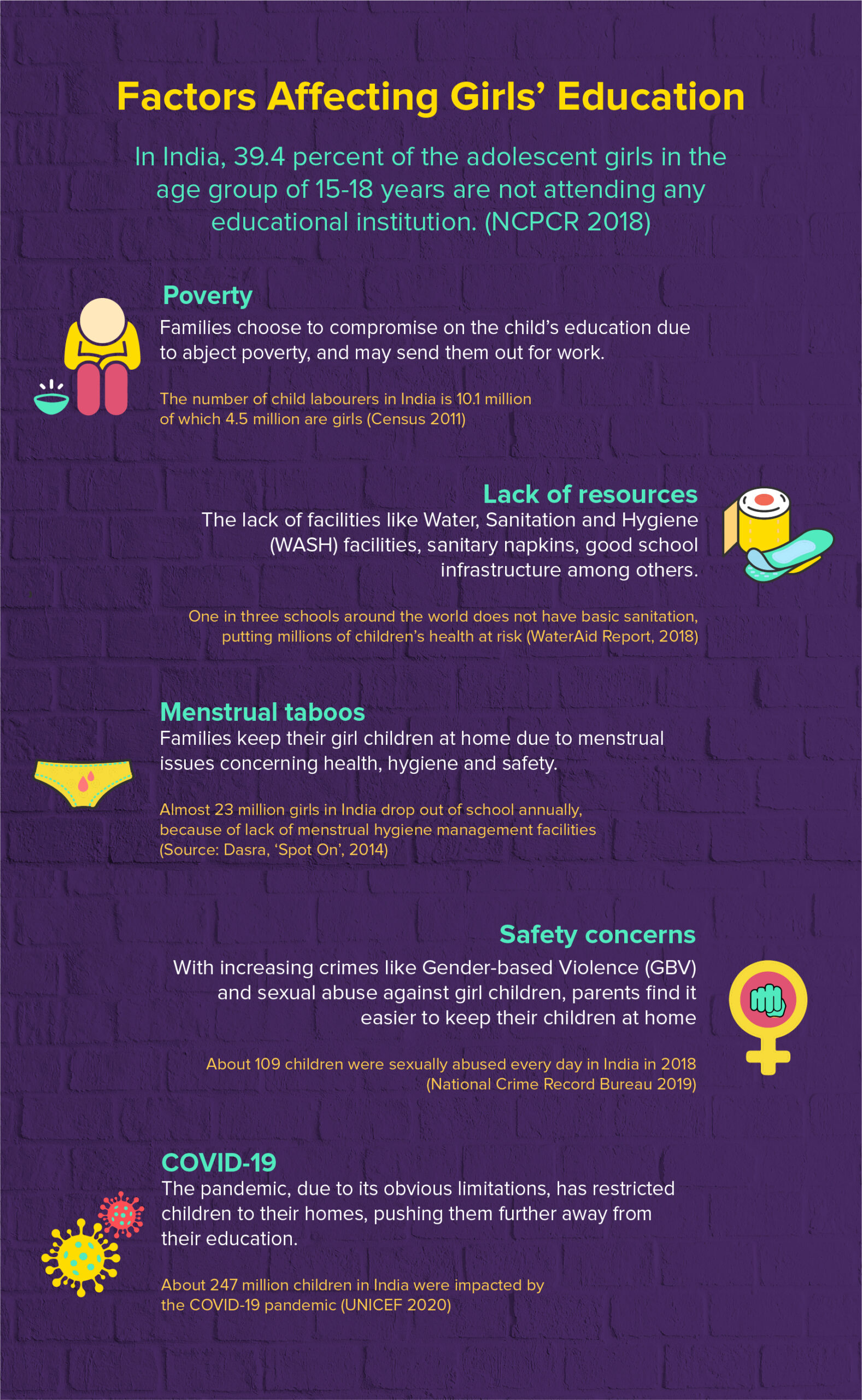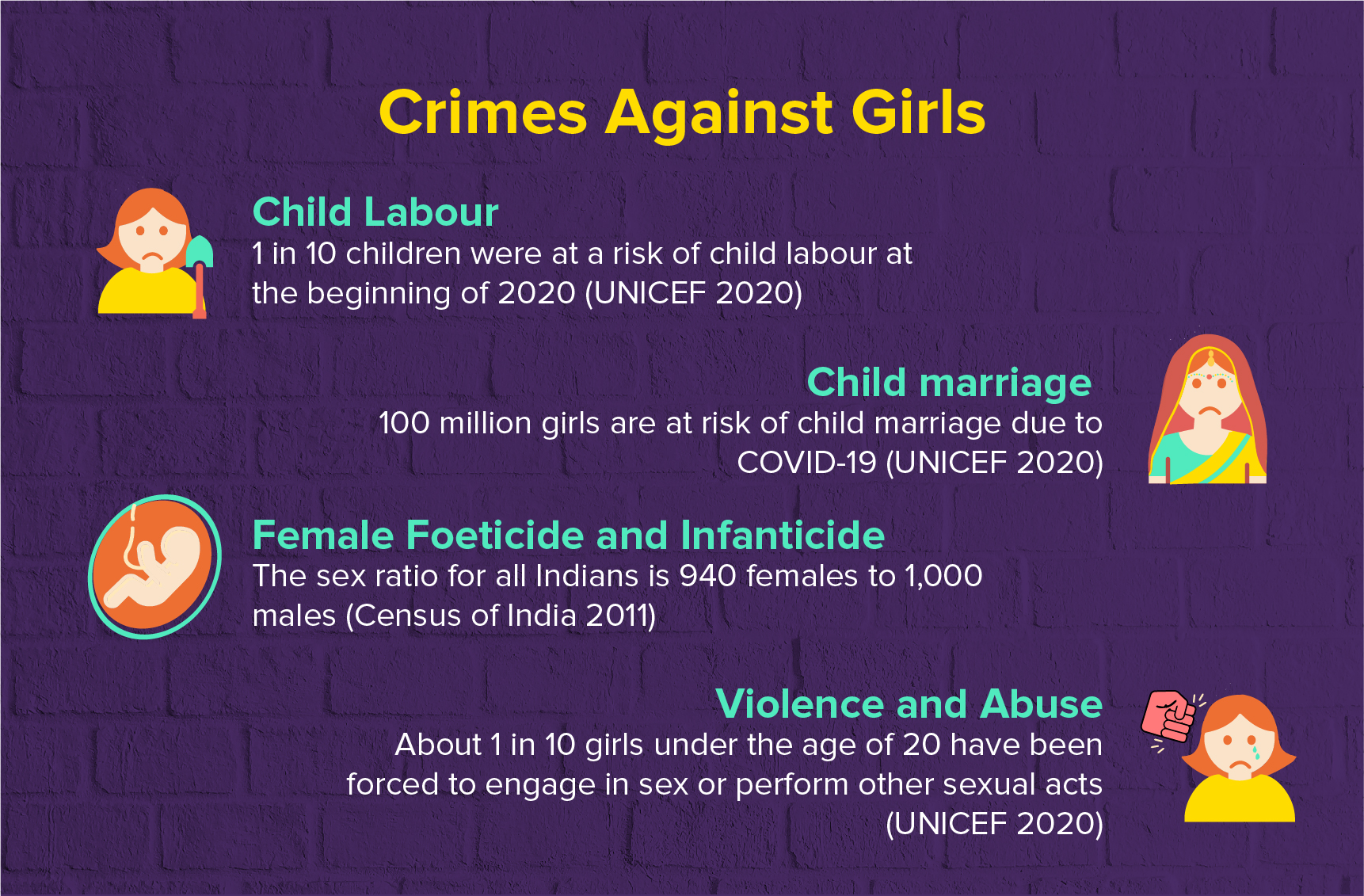
With a skewed gender ratio of 943 females per 1000 males (Census of India 2011), India is far from being called a developed country. While in many countries, a girl or boy child won’t negatively impact the parents, the birth of a girl child in India still remains a hiccup to many parents.
From the time she is born, the parents are ‘burdened’ until the point she is ‘married off’ to a ‘good family’. But in that process, they often forget that each of these girls has their own identity and are potential changemakers of tomorrow.
That being said, it would be a major improvement if we could’ve at least ensured that the “4.6 crore (45.8 million) females ‘missing’ in Indian demography in the year 2020” (UNFPA) could’ve seen the light of day.

When a girl is born, there are a series of other ‘problems’ that weigh down the Indian parent. UNICEF says that about 1 in 10 girls under the age of 20 have been forced to engage in sex or perform other sexual acts. This pushes parents to keep their girl children at home and compromise on their education.
Once they start menstruating, other health concerns set in. One in three schools around the world does not have basic sanitation, putting millions of children’s health at risk (WaterAid Report, 2018), girls facing the brunt of it. In addition, almost 23 million girls in India drop out of school annually, because of a lack of menstrual hygiene management facilities (Dasra, ‘Spot On’, 2014).
The COVID-19 pandemic has not only increased poverty but also put about 247 million children out of schools (UNICEF 2020). The result of that is losing a safe space in school and seeing an increase in child labour. In fact, over 100 million girls are at risk of child marriage due to COVID-19 (UNICEF 2020).
Among these crimes, one of the crucial ones, that is yet to be eliminated despite being illegal, is dowry. In fact, about 7000 dowry deaths were reported in the year 2020 (Statista).

Families that reel in poverty and are unable to educate their daughters are faced with the brunt of dowry demands by people who use the lack of education to torment these daughters.
One such person who faced the struggles of such a situation was Devendra Kumar, who as a boy was abandoned by his parents when he was 2, in the slums of Delhi.
Devendra’s personal struggles pushed him towards finding a purpose in life. This purpose was fulfilled when he started the Ladli Foundation, an NGO focused on changing the lives of girl children in the country. With a shared vision, BYJU’S EFA joined hands with the Ladli Foundation to distribute over 1,00,000 licenses over 3 years.
While Devendra raised his sister by himself, both of their education was severely compromised. When the time came for Devendra’s sister to be married, many families asked for dowry, banking on the fact that she was not educated.
“When a girl child is born, first, the parents think of how to get her married. In fact, they don’t save up for her education, but for her marriage. This is the reason for so many suicides and dowry deaths,” Devendra says.
Unable to tolerate this kind of injustice that happens with all those girls who are uneducated and are from poor families, he founded the NGO, Ladli Foundation.
The non-profit has been involved in various campaigns including Menstrual Hygiene Management, preventive healthcare camp, support to unmarried women, providing inclusive education to slum children, and drug de-addiction. These campaigns and activities cater to both girls and boys.

BYJU’S EFA has joined hands with the Ladli Foundation to distribute over 1,00,000 licenses over 3 years.
On International Day of the Girl Child, Devendra shares that what we need to prioritise the most is healthcare and then, education. We as a society also need to put in the effort to eliminate gender-based violence (GBV).
Along with education, he further shares that we need to help them with vocational training and help them stand on their feet. That’s why Ladli also strongly believes in gender sensitisation and that it is key to change the overall standpoint of society.
While one section of rural India may not have access to modern-day digital facilities, there are a whole lot of girls who at least have smartphones. Devendra shares that the only thing they lack is access to good content through these devices.
“We saw that the girls had access to smartphones, but not to good educational facilities. That’s where our collaboration with BYJU’S EFA has helped,” says Devendra.
BYJU’S Education for All hopes to reach out to the lakhs of girl children who are severely impacted by the pandemic. Through the Ladli Foundation, it hopes to reach this number and educate as many girl children as possible.
In phase 1 of the partnership, BYJU’S EFA has distributed over 327 licenses to the child beneficiaries, of which the gender ratio remains neutral and are in grades 6-10.
“With the help of BYJU’S EFA, we have started an e-Pathanshaala with BYJU’S, through which our volunteers and interns guide the students to use the platform,” says Devendra.
While the partnership does have a goal of 1 lakh, Devendra strongly believes that this can go beyond and to help create a revolution.
The Ladli Foundation envisions a strong community of women who are gender-based violence survivors. It runs with the support of about 17 employees, 2300 volunteers, and over 1000 dynamic interns during their vacations, sourced from various universities.
BYJU’S Education for All hopes to reach out to the lakhs of girl children who are severely impacted by the pandemic. Through the Ladli Foundation, we hope to reach this number and educate as many girl children as possible and eliminate the gaps in creating inclusive education.
With the support of Ladli’s strong team, we strive to work together and give wings to as many girls as possible. This will truly push us and enable us to reach our dream of empowering more than 5 million children by 2025.
If you have a digital device that is not in use, you can be a part of this mission, too! Click here to know more about our BYJU’S Give initiative.
Anju is a peace-lover, a video-game addict, and a childhood doodler who imagined that the scribbles were words. This storyteller enjoys a good read, some doodling, and learning new languages. One day, she hopes to write her own story someday, and hopefully in the French language, too! She never loses hope of making the world a better place to live in.
Comments
Innabat Yasmeen
November 18, 2021
Girl Empowerment
Innabat
November 18, 2021
Girl empowerment
Beemari shruthi
November 5, 2021
???
Haritha Kukatla
October 20, 2021
Save the girl child
Haritha Kukatla
October 20, 2021
Save girl cild
Webasha Technologies
October 20, 2021
thanks for sharing this blog. thank you so much.
Mary george
October 11, 2021
Let your dreams come true